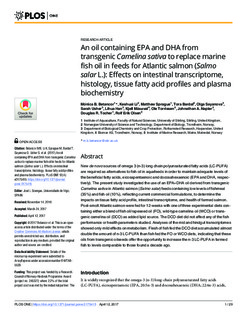| dc.contributor.author | Betancor, Monica B | |
| dc.contributor.author | Li, Keshuai | |
| dc.contributor.author | Sprague, Matthew | |
| dc.contributor.author | Bardal, Tora | |
| dc.contributor.author | Sayanova, Olga | |
| dc.contributor.author | Usher, Sarah | |
| dc.contributor.author | Han, Lihua | |
| dc.contributor.author | Måsøval, Kjell | |
| dc.contributor.author | Torrissen, Ole | |
| dc.contributor.author | Napier, Johnathan | |
| dc.contributor.author | Tocher, Douglas R. | |
| dc.contributor.author | Olsen, Rolf Erik | |
| dc.date.accessioned | 2017-11-30T08:19:45Z | |
| dc.date.available | 2017-11-30T08:19:45Z | |
| dc.date.created | 2017-08-02T10:13:19Z | |
| dc.date.issued | 2017 | |
| dc.identifier.issn | 1932-6203 | |
| dc.identifier.uri | http://hdl.handle.net/11250/2468588 | |
| dc.description.abstract | New de novo sources of omega 3 (n-3) long chain polyunsaturated fatty acids (LC-PUFA) are required as alternatives to fish oil in aquafeeds in order to maintain adequate levels of the beneficial fatty acids, eicosapentaenoic and docosahexaenoic (EPA and DHA, respectively). The present study investigated the use of an EPA+DHA oil derived from transgenic Camelina sativa in Atlantic salmon (Salmo salar) feeds containing low levels of fishmeal (35%) and fish oil (10%), reflecting current commercial formulations, to determine the impacts on tissue fatty acid profile, intestinal transcriptome, and health of farmed salmon. Post-smolt Atlantic salmon were fed for 12-weeks with one of three experimental diets containing either a blend of fish oil/rapeseed oil (FO), wild-type camelina oil (WCO) or transgenic camelina oil (DCO) as added lipid source. The DCO diet did not affect any of the fish performance or health parameters studied. Analyses of the mid and hindgut transcriptomes showed only mild effects on metabolism. Flesh of fish fed the DCO diet accumulated almost double the amount of n-3 LC-PUFA than fish fed the FO or WCO diets, indicating that these oils from transgenic oilseeds offer the opportunity to increase the n-3 LC-PUFA in farmed fish to levels comparable to those found a decade ago. | nb_NO |
| dc.language.iso | eng | nb_NO |
| dc.publisher | Public Library of Science | nb_NO |
| dc.rights | Navngivelse 4.0 Internasjonal | * |
| dc.rights.uri | http://creativecommons.org/licenses/by/4.0/deed.no | * |
| dc.title | An oil containing EPA and DHA from transgenic Camelina sativa to replace marine fish oil in feeds for Atlantic salmon (Salmo salar L.): Effects on intestinal transcriptome, histology, tissue fatty acid profiles and plasma biochemistry | nb_NO |
| dc.type | Journal article | nb_NO |
| dc.type | Peer reviewed | nb_NO |
| dc.description.version | publishedVersion | nb_NO |
| dc.source.volume | 12 | nb_NO |
| dc.source.journal | PLoS ONE | nb_NO |
| dc.source.issue | 4 | nb_NO |
| dc.identifier.doi | 10.1371/journal.pone.0175415 | |
| dc.identifier.cristin | 1483761 | |
| dc.description.localcode | © 2017 Betancor et al. This is an open access article distributed under the terms of the Creative Commons Attribution License, which permits unrestricted use, distribution, and reproduction in any medium, provided the original author and source are credited. | nb_NO |
| cristin.unitcode | 194,66,10,0 | |
| cristin.unitname | Institutt for biologi | |
| cristin.ispublished | true | |
| cristin.fulltext | original | |
| cristin.qualitycode | 1 | |

